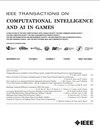Accelerating Board Games Through Hardware/Software Codesign
Q2 Computer Science
IEEE Transactions on Computational Intelligence and AI in Games
Pub Date : 2017-12-01
DOI:10.1109/TCIAIG.2016.2604923
引用次数: 3
Abstract
Board games applications usually offer a great user experience when running on desktop computers. Powerful high-performance processors working without energy restrictions successfully deal with the exploration of large game trees, delivering strong play to satisfy demanding users. However, nowadays, more and more game players are running these games on smartphones and tablets, where the lower computational power and limited power budget yield a much weaker play. Recent systems-on-a-chip include programmable logic tightly coupled with general-purpose processors enabling the inclusion of custom accelerators for any application to improve both performance and energy efficiency. In this paper, we analyze the benefits of partitioning the artificial intelligence of board games into software and hardware. We have chosen as case studies three popular and complex board games, Reversi, Blokus, and Connect6. The designs analyzed include hardware accelerators for board processing, which improve performance and energy efficiency by an order of magnitude leading to much stronger and battery-aware applications. The results demonstrate that the use of hardware/software codesign to develop board games allows sustaining or even improving the user experience across platforms while keeping power and energy low.通过硬件/软件协同设计加速桌面游戏
桌面游戏应用程序在台式电脑上运行时通常提供出色的用户体验。强大的高性能处理器工作,没有能量限制,成功地处理大型游戏树的探索,提供强大的游戏,以满足苛刻的用户。然而,如今越来越多的游戏玩家开始在智能手机和平板电脑上运行这些游戏,这些设备的计算能力较低,且有限的功耗预算导致游戏效果较差。最近的单片系统包括与通用处理器紧密耦合的可编程逻辑,可以为任何应用程序包含定制加速器,以提高性能和能源效率。在本文中,我们分析了将桌游人工智能划分为软件和硬件的好处。我们选择了三款流行且复杂的桌面游戏——Reversi、Blokus和Connect6作为案例研究。分析的设计包括用于电路板处理的硬件加速器,它将性能和能源效率提高了一个数量级,从而导致更强大和电池敏感的应用。结果表明,使用硬件/软件协同设计来开发桌面游戏可以在保持低功耗和低能耗的同时维持甚至改善跨平台的用户体验。
本文章由计算机程序翻译,如有差异,请以英文原文为准。
求助全文
约1分钟内获得全文
求助全文
来源期刊

IEEE Transactions on Computational Intelligence and AI in Games
COMPUTER SCIENCE, ARTIFICIAL INTELLIGENCE-COMPUTER SCIENCE, SOFTWARE ENGINEERING
CiteScore
4.60
自引率
0.00%
发文量
0
审稿时长
>12 weeks
期刊介绍:
Cessation. The IEEE Transactions on Computational Intelligence and AI in Games (T-CIAIG) publishes archival journal quality original papers in computational intelligence and related areas in artificial intelligence applied to games, including but not limited to videogames, mathematical games, human–computer interactions in games, and games involving physical objects. Emphasis is placed on the use of these methods to improve performance in and understanding of the dynamics of games, as well as gaining insight into the properties of the methods as applied to games. It also includes using games as a platform for building intelligent embedded agents for the real world. Papers connecting games to all areas of computational intelligence and traditional AI are considered.
 求助内容:
求助内容: 应助结果提醒方式:
应助结果提醒方式:


